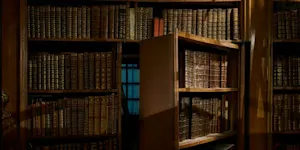What Makes This Word Tick
"Adumbrate" is a decorative word that looks and sounds like it belongs in a dusty old volume of forgotten lore. It means to foreshadow, suggest vaguely, or to outline partially. Imagine you're at the symphony, and the first faint notes give a tantalizing hint of the crescendo to come—that’s adumbrating.
If Adumbrate Were a Person…
Adumbrate would be that enigmatic uncle at family gatherings, who drops hints of grand adventures and, just when you're hooked, winks and says, "But that's a story for another day." You can't quite pin him down, but his words linger, suggesting deeper tales.
How This Word Has Changed Over Time
Originally from the Latin "adumbratus," meaning "to shadow forth," adumbrate has maintained its sophisticated allure through the ages. While it primarily means to outline or indicate faintly, it was once frequently used in the context of heraldry to mean shading or providing contour.
Old Sayings and Proverbs That Use Adumbrate
Adumbrate hasn't quite made its way into the old pots of proverbial wisdom. It’s more of a word that reframes a common thought: one might say, "Every shadow has its light," which, in a way, adumbrates hope.
Surprising Facts About Adumbrate
This word is often used in academic circles, finding its cozy spot in philosophical texts and avant-garde critiques. Despite its Latin roots, it has a modern flair in artistic discussions, where complex ideas are sketched out rather than fully drawn.
Out and About With This Word
Step into an art gallery and you'll find docents adumbrating the deeper meanings behind abstract pieces. It's all about offering a glimpse, never the full picture, keeping an air of mystery alive.
Pop Culture Moments Where Adumbrate Was Used
Adumbrate might not headline in pop culture, but it's the tool for screenwriters who drop Easter eggs and foreshadow plot twists. In your favorite detective series, a glance, a sigh, a hint—these all adumbrate the thrilling conclusion.
The Word in Literature
"Adumbrate" finds its natural home in Gothic novels and evocative poetry, where the landscape is never fully illuminated, and shadows hold the secrets of the plot. Think of the moors in "Wuthering Heights," where every foggy morning adumbrates a dramatic evening.
Moments in History with Adumbrate
Consider the murmurings before the French Revolution—an era adumbrating monumental change. Speeches, pamphlets, and gatherings hinted at the upheaval that was soon to transpire, changing the fabric of society forever.
This Word Around the World
In romantic languages, derivatives of "adumbrate" still carry the same shadowy nuance. In French, "adumbrer" maintains the theme of subtle suggestion, whereas in Italian, "adombrare" casts the same artistic overtones.
Where Does It Come From?
"Adumbrate" comes from the Latin "adumbratus," combining "ad" (to) and "umbra" (shadow). This heritage gifts the word its poetic ability to depict silhouettes and hints, a perfect blend of direction and darkness.
How People Misuse This Word
Sometimes people mistakenly use "adumbrate" when they mean "illuminate," thinking it implies shedding light rather than casting shadows. They might also confuse it with "elucidate," which is all about clarity, where adumbrate is about hints.
Words It’s Often Confused With
Illuminate: Bringing light to something rather than hinting at it.
Elucidate: Making something clear as opposed to suggesting or outlining.
Outline: To summarize the main points, similar but not as suggestive as adumbrate.
Additional Synonyms and Antonyms
Synonyms for "adumbrate" include foreshadow, suggest, and outline. Antonyms would be clarify, explain, and illuminate, which stride boldly into the light, away from shadowy nuance.
Want to Try It Out in a Sentence?
"The author skillfully adumbrated the protagonist's tragic fate with subtle clues woven into the narrative."
















